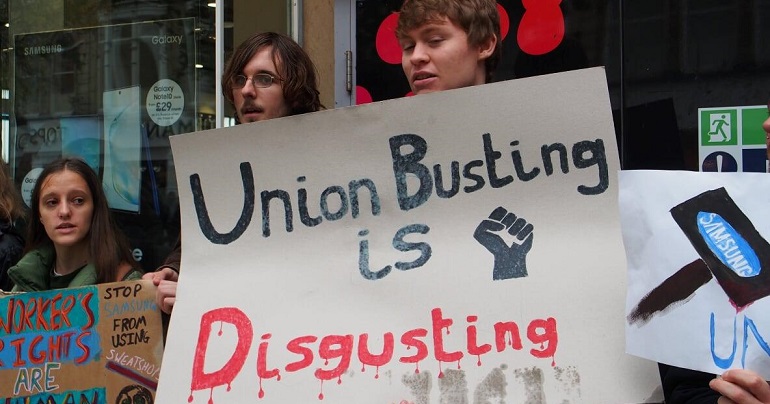These universities are failing to defend workers’ rights

A recent campaign launched by students in the People & Planet network has shown that universities in the North East and Midlands are falling behind when it comes to ethical procurement and sustainability. Students have targeted the North Eastern Universities Purchasing Consortium , calling on them to affiliate to Electronics Watch on behalf of their members. That consortium comprises dozens of high profile institutions including University of Birmingham, University of Bradford and University of York.
Students and sabbatical officers across the North East have banded together to make the call for Sweatshop Free campuses, and are asking for their demands to be supported through signing this petition.
Jay Kerslake, a student from the University of Leeds said they’re supporting the campaign because:
No amount of tech is worth the workers rights abuses currently supported by university purchases. To continue to do so when schemes like Electronics Watch are readily available is unjustifiable.
In Europe, the public sector purchases 1 in every 5 computers, spending €94 billion on ICT each year. This gives the sector both the power and responsibility to use its procurement to raise standards across all supply chain locations – both in Europe and further afield. We all use and depend on electronic devices, especially for work and education. Every year UK universities and colleges spend over £10 billion on products that students use every day. In terms of the electronics industry, each university generally spends between £3million and £12million on computers and other hardware every year and in many cases that money goes to companies with long records of human rights abuses.
That’s why public sector buyers are banding together to demand industry-wide change. The mechanism for this is Electronics Watch, a worker-driven monitoring organisation that centres the voices and concerns of those most affected by electronics manufacturing: the people who make your tech. Whilst there are some ethical tech companies out there, their scale of production is still so small that they cannot fulfill orders of the quantity that universities require, and companies such as Fairphone have been transparent about their difficulty sourcing gold which was not tainted by child labour. The lack of transparency and systemic worker rights’ abuses within the electronics industry runs so deep that this is beyond the power of one company or individual to address, it requires sector-wide support.
With stakes this high, it’s no wonder that nearly half of UK universities have affiliated to Electronics Watch – they recognise the need to leverage their purchasing power to create long-term, sustainable changes within the electronics manufacturing sector. Many universities have affiliated individually but still more have affiliated through their purchasing consortium, with a few exceptions. The North Western Universities Purchasing Consortium (NWUPC), London Universities Purchasing Consortium (LUPC) and the Advanced Procurement for Universities & Colleges (APUC – Scotland) have all affiliated on behalf of their members, meaning that universities in these areas are covered by Electronics Watch. The Higher Education Purchasing Consortium Wales (HEPCW), Southern Universities Purchasing Consortium (SUPC) and North Eastern Universities Purchasing Consortium (NEUPC) have yet to do so, so their supply chains are exposed to potential child labour, union busting and sweatshop conditions. We think it’s time to change that.
The Sweatshop Free campaign over the years has been responsible for some bold and creative action against organisations who refused to take steps to reduce supply chain injustices, such as in December 2015 when “robots” invaded London City Hall to successfully demand Transport For London join Electronics Watch. There is also the more recent example of Sweatshop Free groups organising 48 Hours of Action Against Samsung which took place outside Samsung stores in 7 cities across the UK in October last year. Could NEUPC be the next focus of creative stunts and actions?
The COVID-19 pandemic threw the precarity of globalised supply chains into sharp relief, and modern day slavery is firmly back in the spotlight. Securing ethical and environmentally sustainable electronics supply chains has never been more achievable, and NEUPC have the chance now to be part of the solution rather than part of the problem. Sign the petition to show your support for workers in the global electronics industry. The Sweatshop Free Team are especially interested to hear from union reps at affected universities so if you fit that description then please email sweatshopfree@peopleandplanet.
PS. We hope you enjoyed this article. Bright Green has got big plans for the future to publish many more articles like this. You can help make that happen. Please donate to Bright Green now.




Leave a Reply